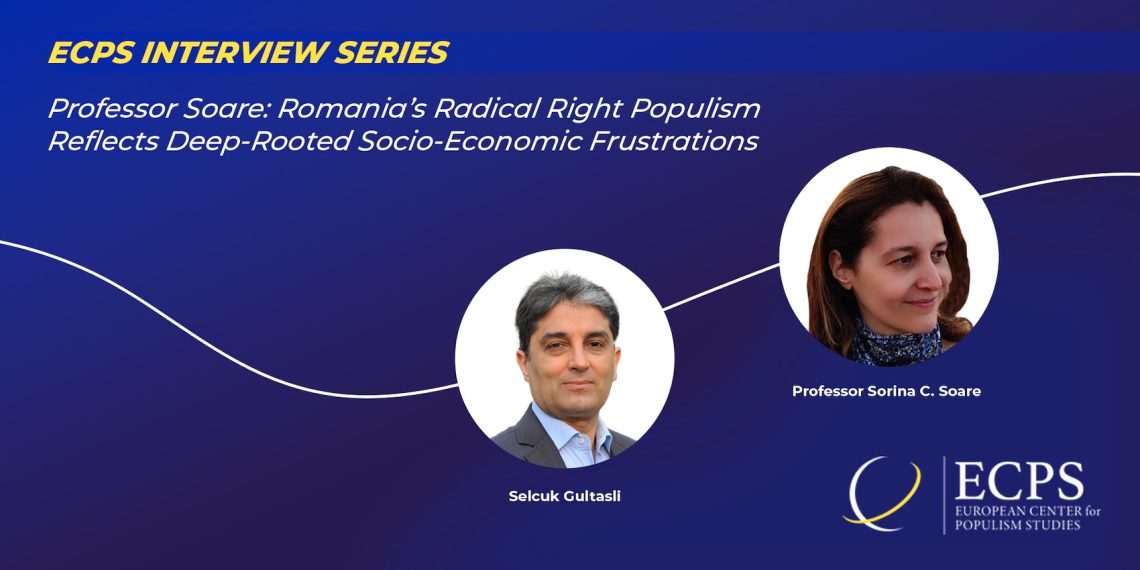Describing Călin Georgescu’s first-round presidential victory as “shocking,” Professor Sorina Christina Soare highlights the pivotal role of social media, particularly TikTok, in mobilizing young voters. “TikTok’s visual simplicity and limited regulatory scrutiny allowed candidates to amplify anti-establishment narratives, effectively engaging younger demographics,” she explains. She emphasizes Georgescu’s populist appeal, driven by “simple yet resonant nationalist rhetoric” and a well-executed campaign strategy. “Georgescu’s polished image and reassuring tone contrasted with more vocal populist figures, enhancing his credibility,” she notes. Despite warning of potential instability, Professor Soare remains optimistic that Romania’s semi-presidential system and pro-European coalitions can sustain the country’s European trajectory.
Interview by Selcuk Gultasli
In a candid and insightful interview with the European Center for Populism Studies (ECPS) on Thursday, Dr. Sorina Christina Soare, Associate Professor of Political Science at the University of Florence, delves into the dynamics shaping Romania’s political landscape. She examines the resurgence of radical-right populist parties (RRPPs), their connections to historical and socio-economic grievances, and the transformative role of social media in contemporary politics.
Professor Soare begins by contextualizing Romania’s political evolution, emphasizing its "tradition of populist mobilization in post-communist politics" while highlighting systemic issues that have persisted since the democratic transition. She attributes the 2020 resurgence of RRPPs like the Alliance for the Union of Romanians (AUR) to a "perfect storm of pandemic-driven malaise, skilled political entrepreneurship, and strong grassroots mobilization." She explains, "Significant portions of the Romanian population do not see themselves as beneficiaries of the democratic transition or EU membership, fueling dissatisfaction and driving migration."
The interview also explores the rise of far-right parties such as AUR and SOS Romania. Despite their shared emphasis on defending national identity and traditional values, Professor Soare draws a clear distinction between their organizational strategies, noting that AUR is a "rooted party with strong social ties," whereas SOS operates as a "personal party" reliant on its leader’s visibility. This reflects broader societal trends, she adds, where "diffuse nationalism and skepticism about EU norms cross party lines," resonating deeply with voters.
Professor Soare further examines how social media, particularly TikTok, has become a powerful tool for mobilizing young voters, pointing to Călin Georgescu’s "shocking" first-round presidential victory in 2024. "TikTok’s visual simplicity and limited regulatory scrutiny allowed candidates to amplify anti-establishment narratives, effectively engaging younger demographics," she observes. On Georgescu’s candidacy, she emphasizes its populist appeal, underpinned by "simple yet resonant nationalist rhetoric" and a well-executed campaign strategy. She notes, "Georgescu’s polished image and reassuring tone contrasted with more vocal populist figures, enhancing his credibility."
Finally, discussing the implications of Georgescu’s potential presidency, Professor Soare underscores the risks and safeguards within Romania’s semi-presidential system. While cautioning against possible instability, she remains optimistic about the country’s ability to maintain its European trajectory, provided mainstream parties can mobilize effectively.


